Parenting a newborn as a biracial couple in Chicago

[ad_1]

This is the first piece in a series called “The First 12 Weeks” that takes readers into the homes of new parents in the Chicago area to better understand the needs of families. Press play on any grey audio player to hear the mothers in their own words. Click here to read more about this project and find out how you can contribute your own story.
From the moment Kristal discovered she was pregnant with her first child, the 30-year-old knew she wanted a midwife who had worked in the Black community to oversee her care.
“I knew I would feel safe,” says Kristal, who herself has a career as a travel nurse in hospital obstetrics units. “I know, from work, that if I don’t feel safe enough to let my guard down fully, it could get in the way of receiving proper care.”
As a Black pregnant woman in America, Kristal understood the risks of poor prenatal care run high. In 2021 the U.S. reported one of the worst rates of maternal mortality in history, according to the Centers for Disease Control and Prevention. And among the 1,205 deaths that year, Black Americans died at a rate nearly three times higher than white Americans.

Kristal, who was born in Belize and moved to the United States at age 8, witnessed the disparity in care play out firsthand at work. Sometimes the issues were small, like hospital staff referring to an unmarried Black father as the “baby daddy.” But other times, racial biases directly impacted medical decisions. (Due to the personal nature of the details shared in this series, WBEZ agreed to withhold the last names of the mothers profiled.)
Kristal recalled one brown patient who came to the hospital acting erratic. “I remember the anesthesiologist asking, ‘What drugs are you taking,’ ” says Kristal. “It wasn’t like we were trying to figure out what was wrong, but rather that she was already guilty of something.”
She saw the same issues impact her family, too. Her pregnant sister suffered from mysterious bouts of fainting spells, severe nausea and excessive weight loss.
“My sister’s entire pregnancy was a domino effect of no one believing her,” says Kristal. “She should’ve been diagnosed as high risk, but no one took her seriously.”
Ultimately, Kristal’s sister delivered her son at 24 weeks. He spent six months in the neonatal intensive care unit (NICU) and even now, at age 2, the toddler remains developmentally delayed. “Her entire pregnancy was a story of improper care.”
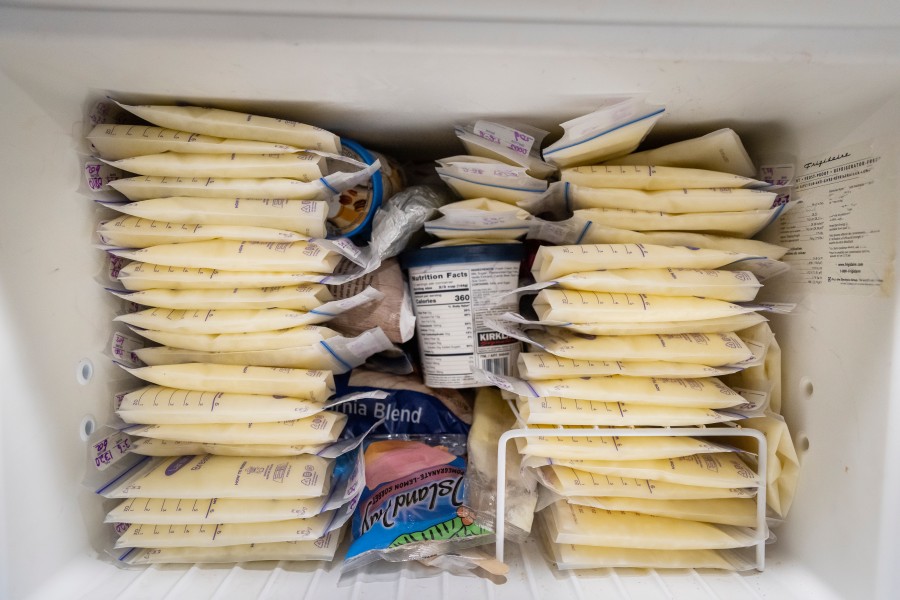
Buoyed by personal and professional experience, Kristal approached her own care with rigorous research, including her selection of a midwife, an OB practice and a delivery hospital. But then her baby, Itzayana, arrived. That would usher in a next chapter in her multigenerational West Englewood home.
She had no roadmap for that. Nor did she have guidance, as a Belizean woman who had married into a Mexican family, for how to parent in a multicultural household with very different sets of expectations.
Kristal predicted an onslaught of opinions on motherhood.
Breastfeeding, working, sleeping, burping — both her family and her husband’s family offered a cacophony of advice.
“My expertise ends after three days postpartum,” says Kristal. “I don’t know what it’s like after you leave the hospital and go home — once cultural norms enter.”
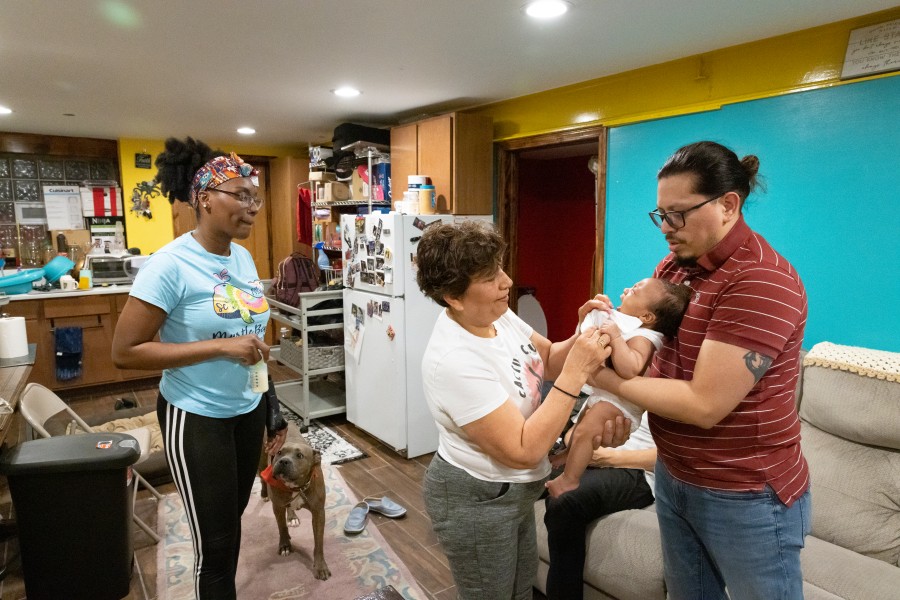
Learning the rules of la cuarentena
One of the things Kristal carefully researched was which midwife to choose. She wanted someone who had worked on the South Side and who cared about reproductive rights and health equity. She found those in Karie Stewart, a University of Illinois faculty member who is a lead researcher on a $7 million grant that aims to address Black maternal outcomes. Stewart is Black, a huge bonus for Kristal.
“We can’t talk about issues around Black maternal health without talking about housing disparities, food insecurity and safety,” said Stewart. “We’re talking about systemic racism. The system is not set up to support these moms and even if they do have access to care, the system is not listening to them.”
This sentiment is also reflected in a slew of recent research papers, which illuminate that racism and unconscious bias continue to result in unequal treatment for Black families. In 2022, the American College of Obstetricians and Gynecologists released a statement asserting that racial and ethnic inequities in maternal health cannot be addressed until racism and racial biases are, too. Put another way: America will never have health equity until society itself is more equitable.

Her midwife coached her through her prenatal appointments and through her quick labor and delivery. Once Itzayana came home, Stewart remained a trusted adviser who was just a text away — even if her expertise was not exactly in the battles that would erupt in Kristal’s home.
Once back in Englewood, Kristal was introduced to the rules of la cuarentena, or quarantine, a tradition in which new mothers are expected to spend their first 40 days postpartum at home and in bed.
“I thought it meant not going out in public,” says Kristal. “No working out; no climbing excessive stairs; taking breaks when I need them. I thought it meant listening to my body and mind.”
That was not what Kristal’s mother-in-law had in mind. Kristal, who spent the first 10 days home living in her in-laws’ second-floor unit, soon realized the rules of la cuarentena were much stricter than she had previously believed.
“They didn’t want me to do anything at all,” recalls Kristal. “Not even lift a pitcher of water.”
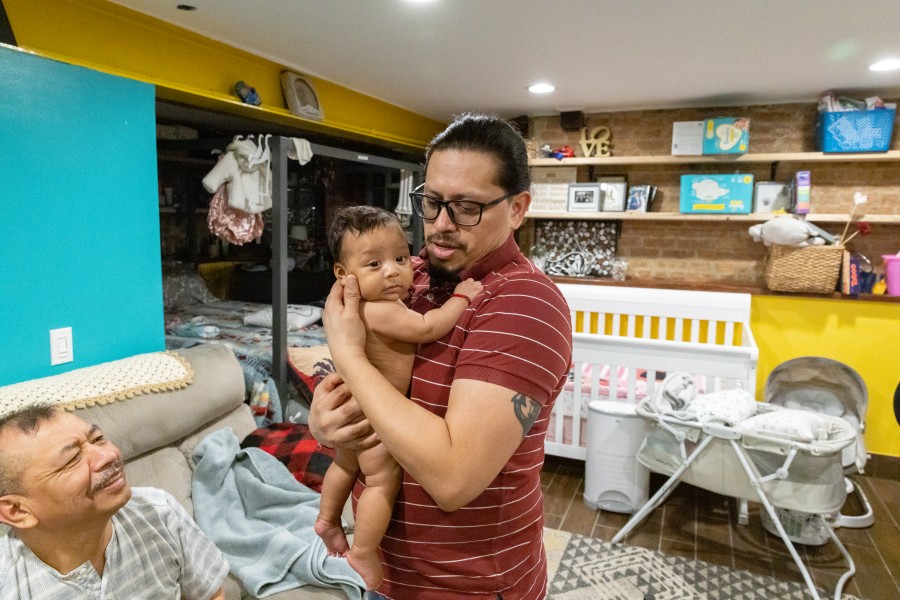
After a week, the attentiveness began to feel more like surveillance. Kristal, an effervescent fast talker with abundant energy reserves, felt judged every time she got up from the couch and scolded when she reached for her own dinner. When she attempted to move a coffee table, Kristal felt as though everyone in the room watched her with reproach.
“I didn’t anticipate how difficult it would feel to me,” says Kristal. “I know that’s their way of caring for me, but that’s not how I want to be cared for.”
Tensions came to a boil one evening over dinner when Kristal asked how many days the quarantine was supposed to last. (She had heard differing opinions.) Kristal can communicate with her Spanish-speaking in-laws but clarifies some phrasing through her husband Ismael. Speaking through Ismael, her mother-in-law told Kristal the question was irrelevant — the new mother had already exerted herself too much. The dig sent Kristal into an angry spiral.
“It felt like an eternity of judgment,” says Kristal, “like if anything bad happens from that point forward, it will fall on me. I almost felt bullied, like I was there in the middle of the room and everyone was pointing at me.”
The dynamic was particularly frustrating for the nurse who had worked hard to help her patients feel a sense of autonomy in their early days of parenthood.
“I advocate for my patients so they can have as much control as possible over a situation that is out of their control,” says Kristal. “That’s what I wanted, too. I wanted control over my own body.”
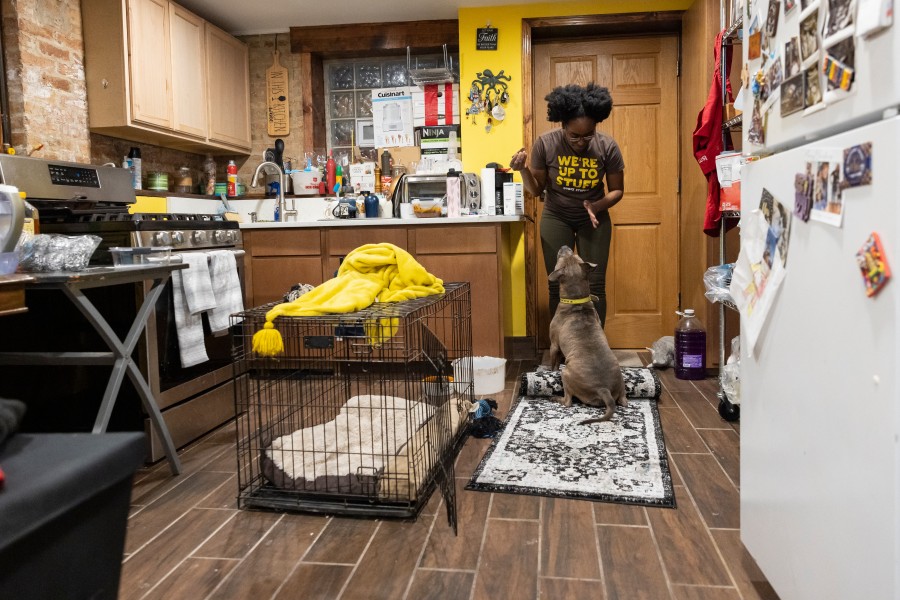
Seeking solace in social media
As Kristal would come to learn, little is in one’s control in the first 12 weeks of parenthood. Hormones soar. Sleep is scarce. And the pressures to put your needs on hold and showcase your baby for family and friends are copious. When Kristal found herself overwhelmed with input and ideologies, she turned to social media for relief. One common theme that popped up on Kristal’s landing page? Family tensions.
One video hit particularly close to home. In it, Tracee Ellis Ross’s Black-ish character, Rainbow Johnson, confronts her mother-in-law, Ruby, after she discovers Ruby has fed formula to Rainbow’s milk-fed newborn. The supply-demand nature of breastfeeding, and concerns that formula can interrupt that delicate equilibrium, can be a flash point.
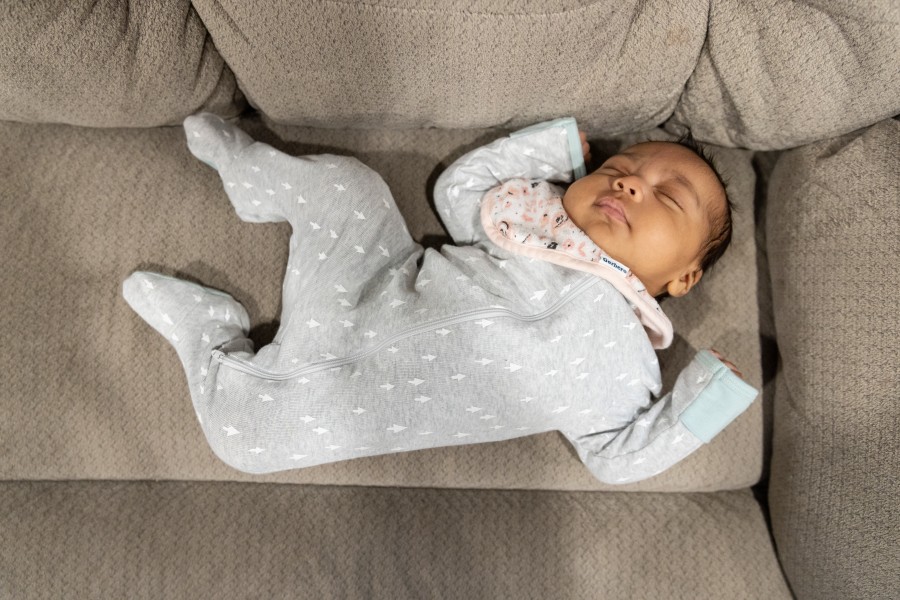
“Are you kidding me?” Ross’s Rainbow says, exasperated and angry. “You know what? I put up with so much from you … You walk all over me and I let you in my home. But you’ve crossed a line.”
“It’s about feeling judged, choosing the road that you choose when taking care of your baby,” says Kristal, reflecting on her social media consumption. “[Videos] help me understand what I’m feeling. They also validate my feelings.”
Popular media can also have the equal and opposite effect. Social media is littered with “Momfluencers” who peddle quixotic portraits of maternity. This distorted internet fairytale rarely reflects the messy reality of healing bodies, fussy babies and the multitude of struggles that couple new parenthood.
Likewise, it hardly accounts for multigenerational, multicultural households where differing expectations can exacerbate postpartum mental health challenges.
Perhaps that’s why Kristal was not the only one who identified with the exasperated, exhausted Rainbow of Black-ish. Just six weeks after the video was posted, it had been viewed nearly 5 million times and 6,400 viewers left comments, mostly celebrating the show’s honesty.
“Finding social support is imperative,” said Rachel Caskey, an associate professor at the College of Medicine at University of Illinois Chicago who focuses on maternal health outcomes. “But it doesn’t have to be a certain person. It’s really about having somebody you can turn to when you’re really struggling.”
Sometimes that person may be a stranger, or even a fictional character, whose experience helps a new mother see that she’s not alone.
Setting boundaries and learning to trust instincts
It’s just past noon on a sunny March morning and Kristal, broom in hand, delicately maneuvers around boxes of bottles, wipes and diapers as she sweeps the floor of her garden unit apartment. Her portable breast pump quietly whirs beneath her oversized T-shirt with the iconic pop star Aliyah. Itzayana is now 10 weeks old, and every few minutes, Kristal checks on her daughter, who is asleep in her baby seat.
When Kristal finishes cleaning and pumping, she turns her attention to the television. The song “Tao, Tao” by the Mexican cumbia group Control is cued up on the screen. Kristal and Ismael volunteered to choreograph four dances for their niece’s upcoming quinceanera, and she needs to work out the steps before the evening rehearsal. She plays the song and takes out a notebook.
At 10 weeks postpartum, Kristal’s in-laws have taken a step back. Kristal and her husband, Ismael, are communicating better, too.
“A lot of times I didn’t put Kristal first,” says Ismael, reflecting on the first 40 days postpartum. “But I realized I didn’t want Kristal to feel like she was by herself. And while I wanted the baby to be OK, it was also important to me that Kristal was OK, too.”
For Ismael, that meant creating some boundaries with his parents. “I’m more assertive with them now,” he adds. “It isn’t easy, but we’re getting there.”

Kristal also still texts with her midwife, Karie Stewart, for advice and support. Keeping that kind of connection, says Stewart, is an essential step in ensuring better health outcomes for Black women.
“We know most mortality and morbidity happens for Black moms in those first two months postpartum. What we’re trying to do is remove any barrier that might get in their way of care.”
That can mean helping with child care, offering a ride, or just answering a spur-of-the-moment question.
Chicago is starting to welcome more support for Black mothers. Groups of Black doulas and midwives are more formally organizing collectives and spreading the word about their services. A pair of Black midwives, including Stewart, want to open a freestanding birth center on the South Side. And the University of Illinois Chicago has opened a novel clinic that prioritizes postpartum care for mothers alongside regular newborn pediatric visits.
Culturally in America, mothers tend to recede into the background once a baby is born, and such programs recognize this attitude can be harmful — even dangerous — particularly when it comes to mental health support. Even for those who can find help, what’s available now is only patchwork solutions.
Still, to build something more sustainable, says Stewart, you can start small.
“Research has shown that if you have one doctor who is Black in a community, the life expectancy for that Black population increases.”
That’s one reason the well-connected midwife referred Kristal to a Black pediatrician for baby Itzayana.
“I think it will be easier for Itzayana to let her guard down when she’s older,” says Kristal. “Like, if there’s something going on at home, and it’s affecting her mental health, it could make it easier for her to reach out for help.”
The choice signals Kristal’s own emerging parenting style, one formed from personal experience. Like any new parent, her approach to motherhood will no doubt change in coming months and years. She’s already better at filtering through the chorus of counsel. And at 12 weeks postpartum, she has learned one essential lesson: In the end, the voices that matter most belong to you and your baby.
Elly Fishman is a freelance writer and the author of “Refugee High: Coming of Age in America.” Manuel Martinez is a visual journalist at WBEZ. Additional visual support was provided by WBEZ archivist Justine Tobiasz and producers Andjela Padejski and Mendy Kong.
The project was edited by Cassie Walker Burke and fact-checked by Molly Morrow. Audio files, which were recorded and filed by the mothers featured in the stories, were engineered by J. Kyle White-Sullivan.
[ad_2]
Source link
